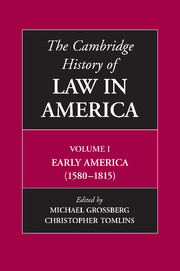Book contents
- Frontmatter
- 1 Law, Colonization, Legitimation, and the European Background
- 2 The Law of Native Americans, to 1815
- 3 English Settlement and Local Governance
- 4 Legal Communications and Imperial Governance: British North America and Spanish America Compared
- 5 Regionalism in Early American Law
- 6 Penality and the Colonial Project: Crime, Punishment, and the Regulation of Morals in Early America
- 7 Law, Population, Labor
- 8 The Fragmented Laws of Slavery in the Colonial and Revolutionary Eras
- 9 The Transformation of Domestic Law
- 10 Law and Religion in Colonial America
- 11 The Transformation of Law and Economy in Early America
- 12 Law and Commerce, 1580–1815
- 13 Law and the Origins of the American Revolution
- 14 Confederation and Constitution
- 15 The Consolidation of the Early Federal System, 1791–1812
- 16 Magistrates, Common Law Lawyers, Legislators: The Three Legal Systems of British America
- Bibliographic Essays
- Notes on Contributors
- Index
- References
13 - Law and the Origins of the American Revolution
Published online by Cambridge University Press: 28 November 2008
- Frontmatter
- 1 Law, Colonization, Legitimation, and the European Background
- 2 The Law of Native Americans, to 1815
- 3 English Settlement and Local Governance
- 4 Legal Communications and Imperial Governance: British North America and Spanish America Compared
- 5 Regionalism in Early American Law
- 6 Penality and the Colonial Project: Crime, Punishment, and the Regulation of Morals in Early America
- 7 Law, Population, Labor
- 8 The Fragmented Laws of Slavery in the Colonial and Revolutionary Eras
- 9 The Transformation of Domestic Law
- 10 Law and Religion in Colonial America
- 11 The Transformation of Law and Economy in Early America
- 12 Law and Commerce, 1580–1815
- 13 Law and the Origins of the American Revolution
- 14 Confederation and Constitution
- 15 The Consolidation of the Early Federal System, 1791–1812
- 16 Magistrates, Common Law Lawyers, Legislators: The Three Legal Systems of British America
- Bibliographic Essays
- Notes on Contributors
- Index
- References
Summary
The revolution that occurred in North America during the last quarter of the eighteenth century was the unintended consequence of a dispute about law. During the dozen years between 1764 and 1776, Britons on both sides of the Atlantic engaged in an elaborate debate over the source and character of law within the larger British Empire. Whether the King-in-Parliament, the ultimate source of statute law in Great Britain, could legislate for British colonies overseas was the ostensible question in dispute, but many other related and even deeper legal issues involving the nature of the constitution of the empire and the location of sovereignty within the empire emerged from and were canvassed thoroughly during the debate. On neither side of the Atlantic was opinion monolithic, but two sides, one representing the dominant opinion in metropolitan Britain and the other the principal view in the colonies, rapidly took shape. The failure to reconcile these positions led in 1775 to open warfare and in 1776 to the decision of thirteen of Britain’s more than thirty American colonies to declare their independence and form an American union. This chapter examines the nature and shifting character of this dispute and its place in the larger process of imperial legal and constitutional thought and practice.
- Type
- Chapter
- Information
- The Cambridge History of Law in America , pp. 447 - 481Publisher: Cambridge University PressPrint publication year: 2008
References
- 1
- Cited by



